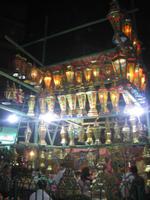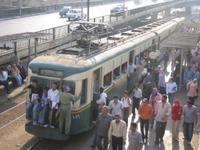Ramadan

I've often been walking home since the 4th of October. Its a decent 40 minute's walk across the city from where I work to the apartment here and though I do enjoy walking, this daily forty-minuter is not one I'll be making for the remainder of the year. Surely I've better things to do with 40 minutes. But the reality is that given I have the time (I've been getting off work around 2 everyday) and that mass transportation is simply not an option (due to undesirable overcrowding and the fact that walking is probably faster anyways given the traffic:>), my two legs eagerly assume the job of returning home, or wherever else I'm going for that matter. And what better way to take in the character of a city than by foot, as inevitable surprises seemingly wait around
 every corner, especially during Ramadan--Islam's holy 9th month of the lunar calendar in which we are now in the midst of here in Egypt. And so I choose to walk, and sometimes even manage to snap a picture here and there of the chaos that occurs in the hours before sunset, like the photo here of typical business in a Ramadan sweet shop around 3PM. I suppose I could use the extra exercise too as there's been ample food intake this month...
every corner, especially during Ramadan--Islam's holy 9th month of the lunar calendar in which we are now in the midst of here in Egypt. And so I choose to walk, and sometimes even manage to snap a picture here and there of the chaos that occurs in the hours before sunset, like the photo here of typical business in a Ramadan sweet shop around 3PM. I suppose I could use the extra exercise too as there's been ample food intake this month...From schools to businesses, the city virtually shuts down at 2PM everyday as all spill into the streets scrambling for taxis, clawing onto the outside of overexploitation buses, shoving in behind the closing doors of the underground, or riding the front of the tram (see photo)
 , all in order to arrive home by sunset (today at 5:17PM as public television broadcasts the daily breaking of the fast) with whatever special culinary surprises picked up on the way. For at sunset is the famous "iftar," or the breaking of the fast--a great meal shared with family and friends following a daily period of fasting from sunrise to sunset. The fast entails no food, water, or even sex during daylight hours fo Ramadan is meant as a time for spiritual renewal for the Muslim, free from earthly distractions. For not only was it in the 9th month of the lunar calendar in which the Koran was first spoken to Mohammed, but he began to annually set aside this month for spiritual renewal through daily fast. And thus to the Muslim, Ramadan exists to this end: makeshift areas of worship are set-up on the street for an influx in worshipping men, and many men and women can be seen traveling with an open Koran as they chant the scriptures. Buses and the underground have proven ideal for communal worship as together they chant from their holy book.
, all in order to arrive home by sunset (today at 5:17PM as public television broadcasts the daily breaking of the fast) with whatever special culinary surprises picked up on the way. For at sunset is the famous "iftar," or the breaking of the fast--a great meal shared with family and friends following a daily period of fasting from sunrise to sunset. The fast entails no food, water, or even sex during daylight hours fo Ramadan is meant as a time for spiritual renewal for the Muslim, free from earthly distractions. For not only was it in the 9th month of the lunar calendar in which the Koran was first spoken to Mohammed, but he began to annually set aside this month for spiritual renewal through daily fast. And thus to the Muslim, Ramadan exists to this end: makeshift areas of worship are set-up on the street for an influx in worshipping men, and many men and women can be seen traveling with an open Koran as they chant the scriptures. Buses and the underground have proven ideal for communal worship as together they chant from their holy book.Yet as common to all relationships of interwoven religion and culture, Ramadan manifests itself primarily in its communal affectations, as a cultural background has developed carrying a distinct aura above and beyond the personal spirituality of the time. Like the Christmas that I know, to Ramadan belongs that special 'feel' supported by years upon years of traditions and practices. Indeed, you know "Its that time of year" in Egypt when layers upon layers of streamers are strung in the narrow alleyways between tall apartment buildings, when the lights of fanooset (Ramadan lamps) of all sizes and colors are hung by the doors of Muslims(tradition from the early 1400's?? in which many would process to the countryside to observe the new moon, confirming the beginning of Ramadan. Today they are lit to mark the breaking of the fast at sunset, and extinguished come morning), when makeshift tents of brilliant red and blues are set-up on every corner to house iftars open to the public (and displaying someone's great wealth who provides food every night of Ramadan for any man who can manage to land an open seat at the table). And of course beyond these outward visibilities, there are the other signs of Ramadan like the crazy driving (don't be late for the iftar!!), the incessant spitting in the streets(yes, the fast includes even your own saliva), men in altogether foul moods come early afternoon, and the rise of the toys, sweets, and meat markets every half block(75% of all meat consumed in Egypt is during the time of Ramadan, and together with the sweets one can believe that despite the daily fasting, something like 90% of Egyptians actually gain weight during Ramadan).
As an occasion for sharing with family and friends of all kinds, even a Christian American has been invited to several iftars in the last three weeks in the homes of personal friends, amongst co-workers, and in the tent across the street. And these have provided wonderful memories here sharing in frank and often humorous conversation, attempting many new kinds of foods, eating until there's really not any room for desert (but then being convinced that there is), and feeling the pure hospitality of Egyptian Muslims willing to participate in relationships bridging a large cultural gap. For as we eat around the same table and laugh around the same table and belch around the same table and feel sick around the same table, we can't help but feel the differences fall away in the face of our genuine similarities. There is a saying here (among many sayings) used by Egyptians of all religions both around the table and beyond: ilhamdoolilah (thanks be to God). Together we thank One who is greater for the chance to live and experience what it means to be human in our absolute finitude. Indeed, amidst the piles of beef, the the mass of macaroni, the endless bowls of salad, the unleavened bread that serves as our plates, and the wonderful rice pudding, we find that we are utterly dependent upon each other in this world, moment by moment molding together the present into the
 world in which we all live. Now in this world of 'globalization' our lives are integrally intertwined, and therefore any action for the good must be rooted in understanding. Looking like me for a place to begin?? Maybe start with a simple invitation:>
world in which we all live. Now in this world of 'globalization' our lives are integrally intertwined, and therefore any action for the good must be rooted in understanding. Looking like me for a place to begin?? Maybe start with a simple invitation:>
0 Comments:
Post a Comment
<< Home